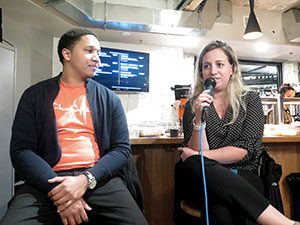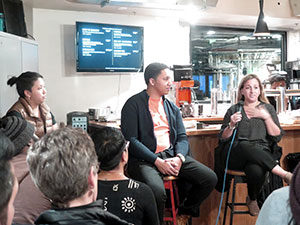
Lucas Turner-Owens of the Boston Ujima Project and Yamila Ruiz of Restaurant Opportunities Centers United spoke at Slow Food Boston’s panel. — Photos by Shira Laucharoen
By Shira Laucharoen
Panelists and community members explored the topic of fairness in the restaurant industry at Slow Food Boston’s second Slow Food Conversation: Worker Justice = Food Justice on November 19. Hosted at Union Square’s Remnant Brewing, the talk featured speakers Yamila Ruiz, director of RAISE at Restaurant Opportunities Centers United (ROC United), and Lucas Turner-Owens, fund manager of the Boston Ujima Project. The event was moderated by Irene Li, chef and operating manager of Mei Mei Restaurant.
During the panel, speakers asked attendees to reevaluate the attitudes and perceptions around the restaurant industry shaped by cultural biases. Just as some work gets gendered and then depreciated in its value, so some work gets racialized and then depreciated in its value, said Ruiz.
“Why are folks interested in spending one hundred dollars at some restaurants and then not at others?” asked Ruiz. “Why do we think some food should be cheap?”
Ruiz said that in order to pursue equity in the restaurant industry, the country needs to see “an industry shift, a narrative shift, and a cultural shift.” She explained that there is still a need for transparency for consumers and that the most important thing consumers should know is the true cost of labor that goes into preparing their food. Most people care more about “where their chicken comes from than fair labor, how much the worker is getting paid,” she said, while many workers continue to get paid below minimum wage.

Moderator Irene Li, Turner-Owens, and Ruiz discussed the topic of fairness in the restaurant industry during the talk.
There is still work to be done to support restaurant wait staff who may be immigrants and are in some cases undocumented workers. Turner-Owens said that the Ujima Project has developed a Sanctuary Business Pledge, a movement to protect immigrant workers from exploitation.
“Some restaurants will hire people that they know are undocumented and then use that to threaten them, by calling ICE,” said Turner-Owens.
Ruiz said that many establishments have become “Sanctuary Restaurants,” where individuals can understand that “when you eat at that restaurant, you are safe,” she said. These businesses have adopted a stance against racism, homophobia, sexism, and xenophobia, by creating an inclusive environment.
Transparency is a vital element in running an ethical business, said Li. Open book management, which gives employees relevant financial information about the company, making the management accessible to everyone who works there, can lead to greater equity. On the other side of the table, restaurant goers should be as aware as they can be of where they are eating and dine with intention.
“The more educated and informed guests are, the closer we get to having an industry we are proud of,” said Li.
Slow Food is an international, volunteer-run organization that aims to build communities and make the food that we eat more sustainable, clean, and accessible. The Boston chapter held its first Slow Food Conversation in March of 2019. ROC United is a non-profit organization that advocates for restaurant workers and seeks to improve wages. The Boston Ujima Project, led by the Center for Economic Democracy, is working to create a community-controlled economy by organizing workers, investors, and business owners.















Reader Comments